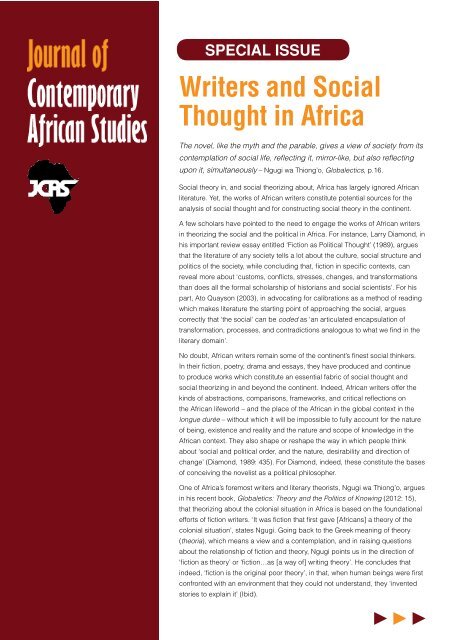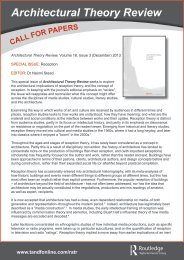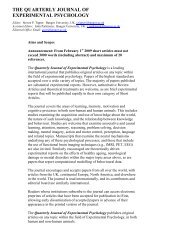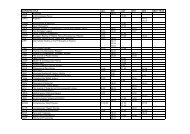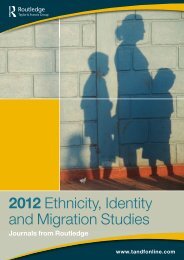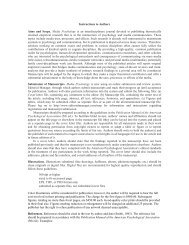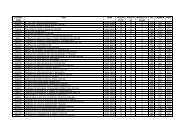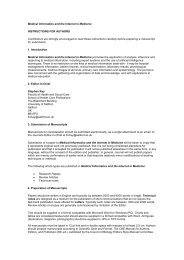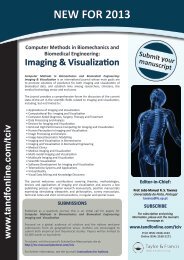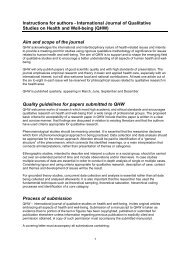Writers and Social Thought in Africa
Writers and Social Thought in Africa
Writers and Social Thought in Africa
You also want an ePaper? Increase the reach of your titles
YUMPU automatically turns print PDFs into web optimized ePapers that Google loves.
SPECIAL ISSUE<br />
<strong>Writers</strong> <strong>and</strong> <strong>Social</strong><br />
<strong>Thought</strong> <strong>in</strong> <strong>Africa</strong><br />
The novel, like the myth <strong>and</strong> the parable, gives a view of society from its<br />
contemplation of social life, reflect<strong>in</strong>g it, mirror-like, but also reflect<strong>in</strong>g<br />
upon it, simultaneously – Ngugi wa Thiong’o, Globalectics, p.16.<br />
<strong>Social</strong> theory <strong>in</strong>, <strong>and</strong> social theoriz<strong>in</strong>g about, <strong>Africa</strong> has largely ignored <strong>Africa</strong>n<br />
literature. Yet, the works of <strong>Africa</strong>n writers constitute potential sources for the<br />
analysis of social thought <strong>and</strong> for construct<strong>in</strong>g social theory <strong>in</strong> the cont<strong>in</strong>ent.<br />
A few scholars have po<strong>in</strong>ted to the need to engage the works of <strong>Africa</strong>n writers<br />
<strong>in</strong> theoriz<strong>in</strong>g the social <strong>and</strong> the political <strong>in</strong> <strong>Africa</strong>. For <strong>in</strong>stance, Larry Diamond, <strong>in</strong><br />
his important review essay entitled ‘Fiction as Political <strong>Thought</strong>’ (1989), argues<br />
that the literature of any society tells a lot about the culture, social structure <strong>and</strong><br />
politics of the society, while conclud<strong>in</strong>g that, fiction <strong>in</strong> specific contexts, can<br />
reveal more about ‘customs, conflicts, stresses, changes, <strong>and</strong> transformations<br />
than does all the formal scholarship of historians <strong>and</strong> social scientists’. For his<br />
part, Ato Quayson (2003), <strong>in</strong> advocat<strong>in</strong>g for calibrations as a method of read<strong>in</strong>g<br />
which makes literature the start<strong>in</strong>g po<strong>in</strong>t of approach<strong>in</strong>g the social, argues<br />
correctly that ‘the social’ can be coded as ‘an articulated encapsulation of<br />
transformation, processes, <strong>and</strong> contradictions analogous to what we f<strong>in</strong>d <strong>in</strong> the<br />
literary doma<strong>in</strong>’.<br />
No doubt, <strong>Africa</strong>n writers rema<strong>in</strong> some of the cont<strong>in</strong>ent’s f<strong>in</strong>est social th<strong>in</strong>kers.<br />
In their fiction, poetry, drama <strong>and</strong> essays, they have produced <strong>and</strong> cont<strong>in</strong>ue<br />
to produce works which constitute an essential fabric of social thought <strong>and</strong><br />
social theoriz<strong>in</strong>g <strong>in</strong> <strong>and</strong> beyond the cont<strong>in</strong>ent. Indeed, <strong>Africa</strong>n writers offer the<br />
k<strong>in</strong>ds of abstractions, comparisons, frameworks, <strong>and</strong> critical reflections on<br />
the <strong>Africa</strong>n lifeworld – <strong>and</strong> the place of the <strong>Africa</strong>n <strong>in</strong> the global context <strong>in</strong> the<br />
longue durée – without which it will be impossible to fully account for the nature<br />
of be<strong>in</strong>g, existence <strong>and</strong> reality <strong>and</strong> the nature <strong>and</strong> scope of knowledge <strong>in</strong> the<br />
<strong>Africa</strong>n context. They also shape or reshape the way <strong>in</strong> which people th<strong>in</strong>k<br />
about ‘social <strong>and</strong> political order, <strong>and</strong> the nature, desirability <strong>and</strong> direction of<br />
change’ (Diamond, 1989: 435). For Diamond, <strong>in</strong>deed, these constitute the bases<br />
of conceiv<strong>in</strong>g the novelist as a political philosopher.<br />
One of <strong>Africa</strong>’s foremost writers <strong>and</strong> literary theorists, Ngugi wa Thiong’o, argues<br />
<strong>in</strong> his recent book, Globaletics: Theory <strong>and</strong> the Politics of Know<strong>in</strong>g (2012: 15),<br />
that theoriz<strong>in</strong>g about the colonial situation <strong>in</strong> <strong>Africa</strong> is based on the foundational<br />
efforts of fiction writers. ‘It was fiction that first gave [<strong>Africa</strong>ns] a theory of the<br />
colonial situation’, states Ngugi. Go<strong>in</strong>g back to the Greek mean<strong>in</strong>g of theory<br />
(theoria), which means a view <strong>and</strong> a contemplation, <strong>and</strong> <strong>in</strong> rais<strong>in</strong>g questions<br />
about the relationship of fiction <strong>and</strong> theory, Ngugi po<strong>in</strong>ts us <strong>in</strong> the direction of<br />
‘fiction as theory’ or ‘fiction…as [a way of] writ<strong>in</strong>g theory’. He concludes that<br />
<strong>in</strong>deed, ‘fiction is the orig<strong>in</strong>al poor theory’, <strong>in</strong> that, when human be<strong>in</strong>gs were first<br />
confronted with an environment that they could not underst<strong>and</strong>, they ‘<strong>in</strong>vented<br />
stories to expla<strong>in</strong> it’ (Ibid).<br />
VVV
<strong>Africa</strong>n writers have captured, <strong>and</strong> cont<strong>in</strong>ue to capture, important aspects of<br />
the totality of <strong>Africa</strong>ns’ experience of the world. This is evident <strong>in</strong> Achebe’s<br />
Th<strong>in</strong>gs Fall Apart, a discourse of the clash of ‘culture’ <strong>and</strong> colonialism, stability<br />
<strong>and</strong> change, as well as <strong>in</strong> Camara Laye’s ambivalent reflections on colonialism<br />
<strong>in</strong> <strong>Africa</strong>n social history <strong>in</strong> A Dream of <strong>Africa</strong>. It is also manifest <strong>in</strong> Sony Labou<br />
Tansi’s The Anti-People, a harangue aga<strong>in</strong>st postcolonial governmentality <strong>and</strong><br />
disorder, as well as <strong>in</strong> Dennis Brutus’ Sirens, Knuckes, Boots (1963), a collection<br />
of poems dependent, to use the words of Niklas Luhmann (2001: 16) ‘upon a<br />
reference to a pre-given “be<strong>in</strong>gness”’.<br />
This special issue of the Journal of Contemporary <strong>Africa</strong>n Studies is<br />
dedicated to exam<strong>in</strong><strong>in</strong>g social thought/social theory <strong>in</strong> the works of <strong>Africa</strong>n<br />
writers – <strong>in</strong> all genres. Questions to be considered by contributors <strong>in</strong>clude – but<br />
can also go beyond:<br />
• the relationship between literature <strong>and</strong> social theoriz<strong>in</strong>g <strong>in</strong> <strong>and</strong> about<br />
<strong>Africa</strong>;<br />
• the role of literature <strong>in</strong> the articulation or illum<strong>in</strong>ation of social thought;<br />
• the evolution of social thought <strong>in</strong> <strong>Africa</strong>n fiction;<br />
• the subject <strong>and</strong> context of social thought as reflected <strong>in</strong>, <strong>and</strong> reflexive<br />
through, literature;<br />
• the aesthetics of social thought <strong>in</strong> <strong>Africa</strong>;<br />
• <strong>Africa</strong>n writers’ conceptions of, <strong>and</strong> disputations about, power, authority,<br />
legitimacy, agency, history, gender, sexuality, culture, ontology,<br />
epistemology, modernity, globalization, etc.<br />
We expect contributions which engage with social theory <strong>and</strong> the social thought<br />
of <strong>Africa</strong>n writers, as well as those that challenge the assumptions (patriarchal,<br />
racist, ethnic, religious, traditional, modernist, etc.) that undergird the works of<br />
<strong>Africa</strong>n writers.<br />
Abstracts should be sent to Wale Adebanwi (anadebanwi@ucdavis.edu) by<br />
August 30, 2013. Full papers by those whose abstracts are accepted must be<br />
submitted by December 15, 2013.<br />
References<br />
Diamond, Larry. 1989. ‘Fiction as Political <strong>Thought</strong>’ (Review Essay). <strong>Africa</strong>n Affairs, 88,<br />
352: 435-445.<br />
Luhmann, Nilas. 2001. ‘Notes on the Project “Poetry <strong>and</strong> <strong>Social</strong> Theory”’, Theory, Culture<br />
<strong>and</strong> Society, Vol. 18, No. 1: 15-27.<br />
Ngugi wa Thiong’o. 2012. Globaletics: Theory <strong>and</strong> the Politics of Know<strong>in</strong>g. New York:<br />
Columbia University Press.<br />
Quayson, Ato. 2003. Calibrations: Read<strong>in</strong>g for the <strong>Social</strong>. M<strong>in</strong>neapolis, MN: The University<br />
of M<strong>in</strong>nesota Press.<br />
www.t<strong>and</strong>fonl<strong>in</strong>e.com/cjca


